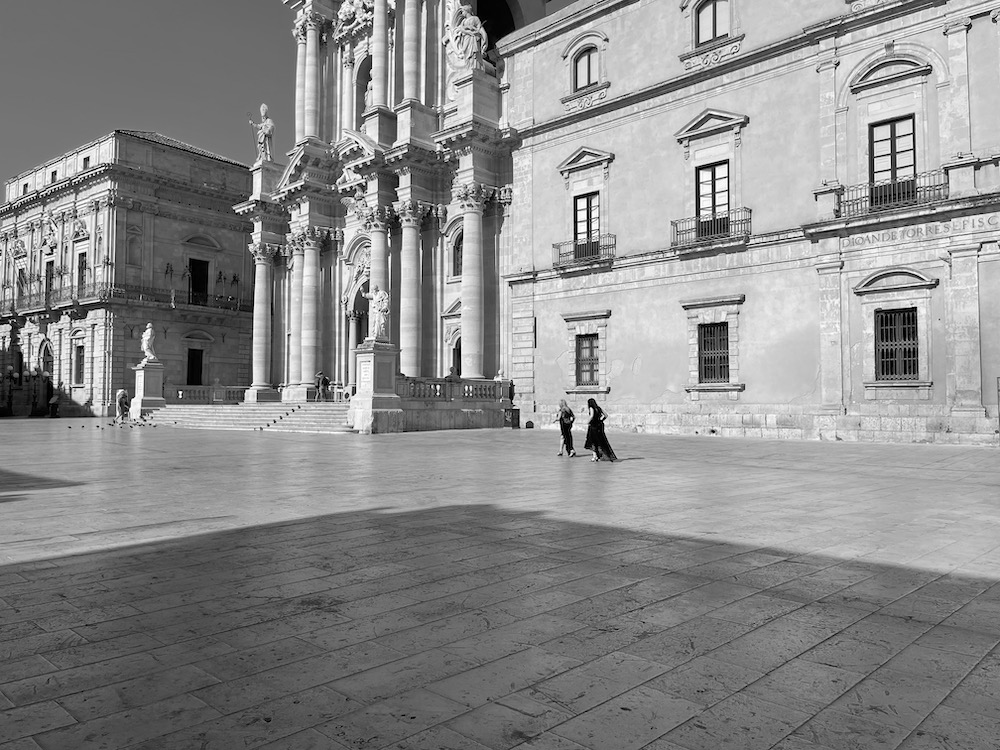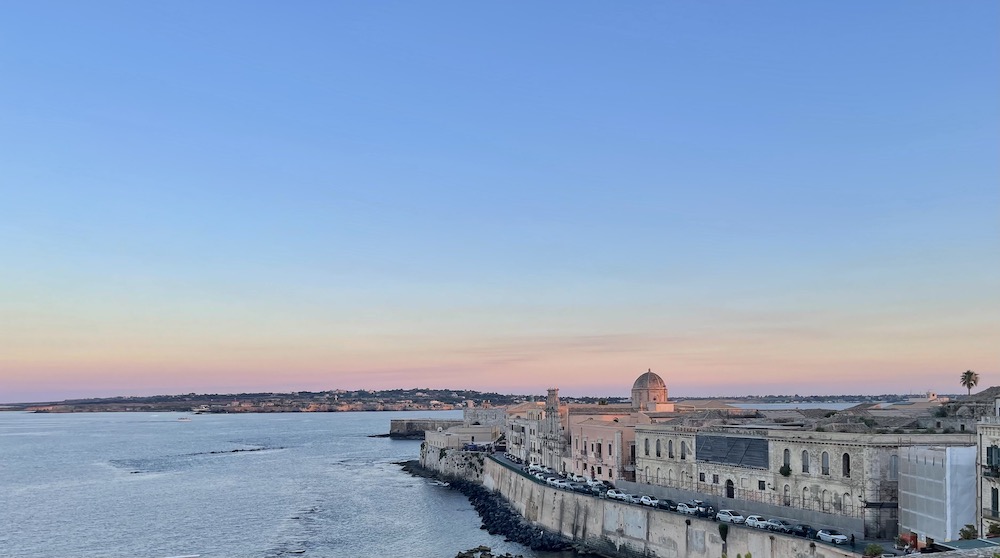If each city is like a game of chess, the day when I have learned the rules, I shall finally possess my empire, even if I shall never succeed in knowing all the cities it contains.
—Italo Calvino, Invisible Cities
Can you describe the mood of Siracusa as you feel/see it?
When talking about Siracusa, I mainly refer to the small island of Ortigia, the historical heart of the city. Should I use an adjective to define it, it would be “everlasting,” eternal, the same definition Rome is known for. The fact that I live between these two cities for professional reasons makes me lose track of time. Ortigia is where my soul and my heart live.
The mood I absorb in Ortigia is a sort of controversial harmony. It is a place where everything is standing still and motionless, but where art, handicrafts, writing, and beauty keep flourishing nevertheless. I think that millennial beauty basically feeds people, and artists above all, inspiring them to generate more beauty.
What is your most heartbreaking memory in this city?
A long walk in the middle of a summer night. I wanted to get lost in the city’s tangle of alleys. Straight to the essence. My steps echoing between ancient walls, the sound of the sea. You could feel the stones breathing along. And that walk could have led me to any year in the history of this enchanted Mediterranean pearl. Away from tourists and daily crowds. An amazing experience I suggest to everyone.
What is the most extraordinary detail, one that goes unnoticed by most, of the city?
The light. If you live there, you end up getting used to it and overlooking how extraordinary it is. Whenever I leave and then come back, it impresses me. It changes during the day, affecting the atmosphere around you. I recommend sitting in Duomo square, enjoying the light and the surrounding poetry.

Photo © Nathalie Handal
What writer(s) from here should we read?
Literature and, inevitably, theater, have belonged to Siracusa since its Greek colonization. The city is still so inspiring that many contemporary writers born or living here have a major role in the national literary scene. Two of my favorite twentieth-century authors, both from Siracusa, whom I think everyone should read, are Elio Vittorini, whose antifascist and richly symbolic novel Conversazione in Sicilia (1941) recounts the protagonist’s trip back from Milan through the light and dark sides of Sicily; and Laura Di Falco, who was a forerunner of many contemporary themes with her novel L’inferriata (1976).
Is there a place here you return to often?
There are many. But Forte Vigliena is usually where I go whenever I need to let my thoughts get lost in the wind. The view of the sea from there is comforting and healing. It’s always windy, and the water is a perfect blend of cobalt blue and emerald green.

Photo © Nathalie Handal
Is there an iconic literary place we should know?
Undoubtedly, the Greek Theater is Siracusa’s temple of drama, literature, and culture. There is also a bookshop in Ortigia that can be considered an iconic literary place. It is the Casa del Libro, a historical bookshop founded in 1930, where you’ll find Sicilian writers like Sciascia, Quasimodo, Vittorini, Di Falco, and many others.
Are there hidden cities within this city that have intrigued or seduced you?
Oh, so many. One for each of the history pages Siracusa could speak about: Greek, Roman, Arabic, Spanish, just to mention some examples. One for each population that settled down here, leaving unmistakable traces.

Photo © Nathalie Handal
Where does passion live here?
In every memorable red sunset over the Porto Grande. There is a moment, the very last moment before the sun goes down beyond the hills, when the sky turns rose-red and the white stone of the Cathedral and surrounding buildings shines like gold. That’s pure, natural passion to me.
What is the title of one of your works about Siracusa and what inspired it exactly?
Two chapters of my book Virità, femminile singolare-plurale (Kalòs, 2021) are dedicated to two great women whose names are linked to Siracusa: Santa Lucia, the most venerated female saint, and Damarete, the clever and magnanimous wife of Gelone, the first tyrant of the city. They are both iconic and inspirational female figures.
My new book, D’amore e di rabbia (Neri Pozza, 2023) is a historical and passionate novel set at the beginning of the last century. In this case as well, I was deeply inspired by the Sicilian and Ortigian atmosphere and setting and enjoyed reinterpreting them.
Inspired by Levi, “Outside Siracusa does an outside exist?”
Of course, but I think in a circular way only. Everything goes, multiplies, and comes back again to be included. Siracusa contains many worlds. They do coexist; none are excluded. Such synergy keeps us from rushing through life as we would in larger metropolises. Paradoxically, there’s no time to rush in Ortigia, because Ortigia, the island within the Mother-Island, has no time at all.
Giusy Sciacca, born in Lentini, lives today between Rome and Siracusa. After studying foreign languages and literatures in Catania, she became a fiction writer and dramatist. In 2021, she published Virità, femminile singolare-plurale (Kalòs), which gives voice to twenty Sicilian women from Mediterranean mythology and history. She writes about books and culture for several newspapers.
Copyright © 2023 by Giusy Sciacca. All rights reserved.











